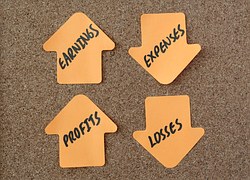Bookkeeping is the primary accounting function in a business, whereas bookkeepers will be in charge of recording and analyzing your business’s accounting system.
As an entrepreneur of a small business, you take the responsibility of preparing your accounts. If growth is anticipated shortly, you need to get a freelancer to do your bookkeeping work. If you expect a lot of improvement in sales, it is advisable to look for a freelance accountant for your business to handle all your accounting functions.
A bookkeeper will record all the business transactions, then pass them on to your accountant, who he/she will do the analysis, prepare reports, management accounts, reviews, recommendations, and interpretation of the accounts for the non-finance owner of the business.
 If you decide to do the accounts without an accounting program, consider whether to use the single-entry or double-entry systems. A single entry system is used where there are not many transactions and to maintain a register to record your transactions. Remember, whether you have fewer transactions or more, you have to be self-employed; therefore, the records have to keep in proper order to do the year-end calculations for tax purposes.
If you decide to do the accounts without an accounting program, consider whether to use the single-entry or double-entry systems. A single entry system is used where there are not many transactions and to maintain a register to record your transactions. Remember, whether you have fewer transactions or more, you have to be self-employed; therefore, the records have to keep in proper order to do the year-end calculations for tax purposes.
Bookkeeping checklist
The requirement is to create a bookkeeping checklist to have a piece of mind and to sleep at night. As money is the lifeblood of any business, accounting tools, and bookkeeping must be adequately maintained daily, monthly, and annually. If not, you will also lose all your money and the business.
Creating a step-by-step bookkeeping checklist will also make you aware of the control.
- A person handling cash will not do the recording of the transaction.’
- Separate payment authorization and signing a check for the same.
- Please do not give all the responsibility to one person unless it’s yourself.
So, the bookkeeping checklist will remind you as to WHAT NEEDs DOING AT A PARTICULAR TIME. You will not miss anything when you follow it carefully.
Weekly
Checking bank balance
Sales invoice payments.
Suppliers bill payments
Save and organize receipts
Weekly invoicing to credit customers
Categorise transactions to software
Move money to a savings account.
Follow–up on unpaid invoices
Pay contractors
Pay yourself
Reconcile the bank account.
Get income statements
Balance sheet
Any other reports?
Estimate tax payments
Review Prior Quarter’s Goals to Actuals
Set Next Quarter Goals
Follow-Up on Unpaid Invoices, Write off or Send to Collections
Invest profit on you.
Annual
Reports Requested from Accountant
Review Annual Reports Against Goals
Set New Year Goals
Reassess Your Salary, Profit, Tax Savings, and Expenses
sat business academy/Basic accounting for small business



